You are using an out of date browser. It may not display this or other websites correctly.
You should upgrade or use an alternative browser.
You should upgrade or use an alternative browser.
After Actium: Two Caesars Are Not Enough
- Thread starter Velasco
- Start date
Great timeline ! I do not have anything else to add
Thanks
Next few updates are being hard to write, working out the creation myth and other theological aspects of Greco-Egyptian Buddhism are proving a bit of a bitch - want to get it just right.
Chapter XXII: The Parthian War of Succession, Part II

Anilai and Asinai ride in the royal chariot

Anilai and Asinai ride in the royal chariot
Having put down the rebellion in Seleucia, the Jewish robber brothers Anilai and Asinai set about strengthening their hold on Babylonia and training a proper military force. Numbers were very quickly buoyed by their fellow countrymen; the promise of an autonomous Jewish land away from the stringent rule of Rome was enough to levy them substantial recruits among the Mesopotamian Jewish communities. The brothers celebrated their newfound positions of power by making advantageous marriages. Anilai, who was in all things chief, married a converted noble lady, Iscah of Adiabene, who was a relation to the royal family thereof, whilst Asinai married the woman Yuwanna, daughter of Moshe bar Ysu, a Jew from Palmyra who they set up as their High priest.
To their north, neither Phraates IV and Artabanus had engaged each other or Kamnaskires the Elamite. The Parthian Empire was enveloped in civil war, and yet, no blood was being shed. It seemed as if all were reluctant to engage in those conflicts which they knew would be decisive; perhaps if they waited events would overcome at least one or other contender and facilitate the path of the victor, whomever he may be.
Undeterred by this uneasy stalemate, the brothers sent word to Kamnaskires of Elam (Elymais), proposing an alliance. They offered him greater autonomy, even outright independence for his kingdom, in return for his support against their mutual enemies. Let them make a common cause, and be united in marriage, and each establish his own Kingdom out of the Parthian carcass. Kamnaskires jumped at the opportunity; their combined armies stood a far better chance of success than individually. Whilst Kamnaskires had custody of the legitimate prince, Rhodaspes, the brothers had the administrative capital Ctesiphon and the would-be royal heiress, Sayarsis; together they would be better able to oust Phraates and come to terms with Artabanus.
In grand style, Anilai and Asinai proceeded to the recently taken Susa. There the alliance was ratified, and the prince Rhodaspes reunited with Sayarsis, whose other nominal husband (and nephew) Mithridates the Mede was left behind under heavy watch in Ctesiphon. As part of the alliance, Kamnaskires married their sister Mariame, in preparation for which he and all the men of his household were circumsised after paying homage to Adonai, the God of the Jewish people.
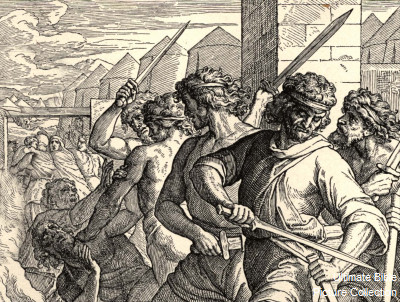
The following day, as the princes of the Elamites recovered in their beds, Anilai, Asinai and their bodyguard fell upon them, slaughtering Kamnaskires and all others they were able to come upon - including his sons, wives, concubines and other princes. The other Elamites in attendance were taken captive but promised mercy in return for their cooperation, which they willingly gave. Fearing reprisals from the common populace, they withdrew quickly from the city and sought refuge outside its walls.
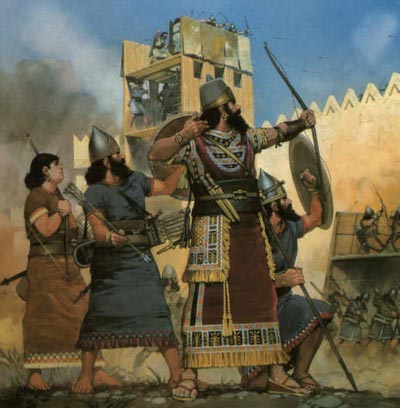
Asinai & Anilai attack Susa
Their army was already positioned and quickly descended into Elymais having received affirmative response from Susa. Asinai and Anilai's act of cruelty incited little, if none, public outcry, and Susa was easily taken. Hostages were taken from among all of the nobles, but they otherwise conducted themselves benevolently. A son of Kamnaskires, by name Onnoskapes, took the throne, with Mariame as wife and regent.
Now in control of Assyria (Adiabene), Babylonia and Elymais, Anilai and Asinai had no time to rest. Having been restored to his throne in Antropatene, the King Darius of Media Antropatene now marched against them, in name of his young son, the would-be Mithridates IV, who they still had in their power. They were soon informed of the league formed between Darius and Artabanus; the two conspired to divide Phraates' kingdom between them, with Darius expanding into Mesopotamia and Media, and Artabanus taking Hyrcania, Persia and all of the other eastern provinces. At last the time had come for Parthia to be bathed in blood.
To their north, neither Phraates IV and Artabanus had engaged each other or Kamnaskires the Elamite. The Parthian Empire was enveloped in civil war, and yet, no blood was being shed. It seemed as if all were reluctant to engage in those conflicts which they knew would be decisive; perhaps if they waited events would overcome at least one or other contender and facilitate the path of the victor, whomever he may be.
Undeterred by this uneasy stalemate, the brothers sent word to Kamnaskires of Elam (Elymais), proposing an alliance. They offered him greater autonomy, even outright independence for his kingdom, in return for his support against their mutual enemies. Let them make a common cause, and be united in marriage, and each establish his own Kingdom out of the Parthian carcass. Kamnaskires jumped at the opportunity; their combined armies stood a far better chance of success than individually. Whilst Kamnaskires had custody of the legitimate prince, Rhodaspes, the brothers had the administrative capital Ctesiphon and the would-be royal heiress, Sayarsis; together they would be better able to oust Phraates and come to terms with Artabanus.
In grand style, Anilai and Asinai proceeded to the recently taken Susa. There the alliance was ratified, and the prince Rhodaspes reunited with Sayarsis, whose other nominal husband (and nephew) Mithridates the Mede was left behind under heavy watch in Ctesiphon. As part of the alliance, Kamnaskires married their sister Mariame, in preparation for which he and all the men of his household were circumsised after paying homage to Adonai, the God of the Jewish people.

The following day, as the princes of the Elamites recovered in their beds, Anilai, Asinai and their bodyguard fell upon them, slaughtering Kamnaskires and all others they were able to come upon - including his sons, wives, concubines and other princes. The other Elamites in attendance were taken captive but promised mercy in return for their cooperation, which they willingly gave. Fearing reprisals from the common populace, they withdrew quickly from the city and sought refuge outside its walls.

Asinai & Anilai attack Susa
Their army was already positioned and quickly descended into Elymais having received affirmative response from Susa. Asinai and Anilai's act of cruelty incited little, if none, public outcry, and Susa was easily taken. Hostages were taken from among all of the nobles, but they otherwise conducted themselves benevolently. A son of Kamnaskires, by name Onnoskapes, took the throne, with Mariame as wife and regent.
Now in control of Assyria (Adiabene), Babylonia and Elymais, Anilai and Asinai had no time to rest. Having been restored to his throne in Antropatene, the King Darius of Media Antropatene now marched against them, in name of his young son, the would-be Mithridates IV, who they still had in their power. They were soon informed of the league formed between Darius and Artabanus; the two conspired to divide Phraates' kingdom between them, with Darius expanding into Mesopotamia and Media, and Artabanus taking Hyrcania, Persia and all of the other eastern provinces. At last the time had come for Parthia to be bathed in blood.
Chapter XXIII: Vipsanian Marches East & Caesarion the Consul
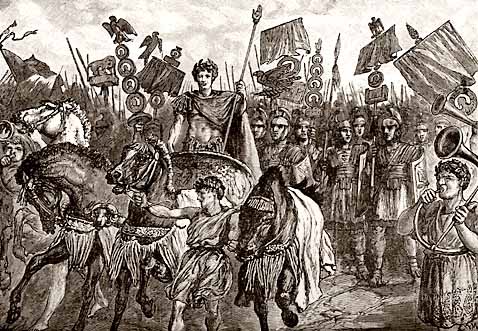
The triumvir-Imperatores Vipsanian Augustus, Crassus Scythicus and Quintus Publicola had proceeded in great estate from their conference at Placentia to Rome. There they presided over grand celebrations and installed Caesarion - that is, Ptolemy Julius Caesar - and Marcus Valerius Messalla Corvinus (Publicola's uncle) as the new consuls. The consuls were given certain extraordinary powers, primarily the immediate extension of their term to the same as the triumvirs' - namely, three years. They were accompanied by their wives, Clodia Pulchra, Livia Drusilla and Vipsania Polla, who were give pride of place; between them they represented the singular alliance that united all three Triumvirs as members of the Julio-Vipsanian house.
Thereafter Crassus regressed to Aquitaine, and Publicola to Cantabria in Spain; Vipsanian's brother-in-law Iullus Antonius accompanied Publicola as newly appointed military tribunes. Likewise, Crassus' step-son Tiberius joined Marcellus among the military tribunes accompanying Vipsanian's legions eastward.

Caesarion had used his tenure as aedile to increase his popularity among the common people, personally financing extravagant public games and excelling himself in all his duties. He expanded the Temple of Vendus Genetrix, the ancestral deity of his gens, adding a separate shrine to the statue of his mother placed there by his father years before. Now, at the unconstitutional age of twenty-five, he ruled as one of two consuls, the highest magristrate of Rome. Internally he was disappointed at being excluded from the triumvirate, but he was, after all, only twenty-five; he would have to bide his time andd wait another three years for the current triumvirate to expire.
Finally, in April 22BC, Vipsanian departed from Rome for the East, being assisted greatly in the organization of this new undertaking by Caesarion, who had already made a name for himself as a highly capable administrator of men and resources.

Caesar's Forum with the Temple of Venus Genetrix
Thereafter Crassus regressed to Aquitaine, and Publicola to Cantabria in Spain; Vipsanian's brother-in-law Iullus Antonius accompanied Publicola as newly appointed military tribunes. Likewise, Crassus' step-son Tiberius joined Marcellus among the military tribunes accompanying Vipsanian's legions eastward.

Caesarion had used his tenure as aedile to increase his popularity among the common people, personally financing extravagant public games and excelling himself in all his duties. He expanded the Temple of Vendus Genetrix, the ancestral deity of his gens, adding a separate shrine to the statue of his mother placed there by his father years before. Now, at the unconstitutional age of twenty-five, he ruled as one of two consuls, the highest magristrate of Rome. Internally he was disappointed at being excluded from the triumvirate, but he was, after all, only twenty-five; he would have to bide his time andd wait another three years for the current triumvirate to expire.
Finally, in April 22BC, Vipsanian departed from Rome for the East, being assisted greatly in the organization of this new undertaking by Caesarion, who had already made a name for himself as a highly capable administrator of men and resources.

Caesar's Forum with the Temple of Venus Genetrix
The following day, as the princes of the Elamites recovered in their beds, Anilai, Asinai and their bodyguard fell upon them, slaughtering Kamnaskires and all others they were able to come upon - including his sons, wives, concubines and other princes. The other Elamites in attendance were taken captive but promised mercy in return for their cooperation, which they willingly gave. Fearing reprisals from the common populace, they withdrew quickly from the city and sought refuge outside its walls.
Hmmm, maybe not such a good idea - they gain a momentary advantage at the cost of no one ever trusting them again. On the other hand, this act is entirely in character for those two.
Hmmm, maybe not such a good idea - they gain a momentary advantage at the cost of no one ever trusting them again. On the other hand, this act is entirely in character for those two.
Exactly. Two street thugs who got lucky likely aren't going to be the savviest polticians
Chapter XXIV: The Parthian War of Succession, Part III
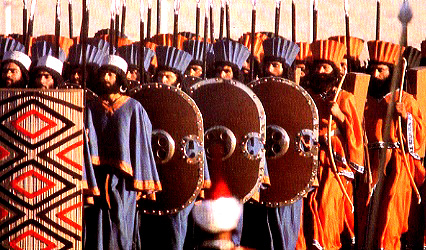

The arrival of the Emperor Vipsanian Augustus' and his legions in Asia coincided with the outbreak of warfare all over Parthia. Darius the Mede had ousted his brother Ariobarzanes from Media Antropatene with the help of the Kings of Osrhoene and Armenia, a victory which allowed him to turn his gaze southward once more and scheme for the imperial crown. At the head of the allied Edessan, Armenian and Media forces he marched into Media proper against the forces of Phraates IV, who faced a simultaneous attack from Artabanus and his Dahae in the north-east. Phraates sent forth expeditionary forces to hold off both enemies, but they were all overcome and the armies of both Darius and Artabanus advanced towards Ectabana, where they eventually trapped Phraates.
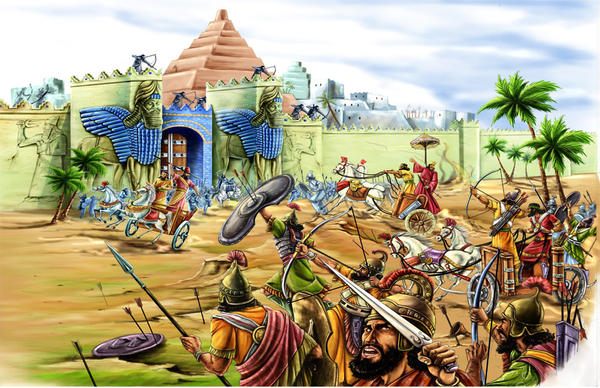
Phraates' men fight to protect Ectabana
The Jewish duo Asinai and Anilai had considered declaring for Phraates, but held off; for now Darius and his ally Artabanus had the upper hand. They knew that, ultimately, he desired the return of his only son and heir, who they had in their power; they had treated the boy well, and could hope for at least some clemency should they come to be in Darius' hands. They also held a considerable swathe of land, from Assyria to Elam, which Darius desired and which they could deliver into his hands immediately, if they so wished, or rather, if his terms were acceptable.
Phraates' dire situation was alleviated by the arrival on the scene of Vipsanian, who had no wish to see a resurgent Media conquer the Parthian Empire, unite it with Media Antropatene and possibly even Sophene (the recently enlarged kingdom of Lesser Armenia held by Darius' father, the Roman client Artavasdes). Vipsanian began his campaign by splitting his force in two; the greater portion marched east, under his command, into Antropatene, whilst the smaller headed for Edessa; having subjugated the respective domains the two forces were to rendezvous in Mesopotamia before marching against the Parthians. Edessa willingly submitted to the Romans upon their arrival; Antropatene however proved a greater task. It was from Antropatene that Vipsanian clinched the deal that sealed his plans for the East. He offered his aid to Artabanus for the latter's bid for the Parthian throne, so long as Artabanus deserted his ally Darius. Instead of sharing the Parthian Empire with Darius, Artabanus would keep the entirety of his conquests, whilst Vipsanian intended to add Osrhoene, Adiabene, Armenia and Antropatene to Rome's eastern holdings - securing complete control of Armenia and expanding Roman rule towards the Tigris.
Artabanus dithered for a month; his opinion was only swayed definitively in Rome's direction by a sudden reverse in events as Phraates scored his first major victory, pushing back Darius' forces. If Phraates managed to turn the tide, he would have need of a stronger ally than Darius; if he was to establish himself as King of Kings, a foreign ally without pretensions on internal Parthian matters made for a better deal than a neighbouring ally with blatant aspirations towards the Parthian throne. His betrayal was soon made known to Darius, who was forced to turn back from Media to protect his rear from Roman aggression.
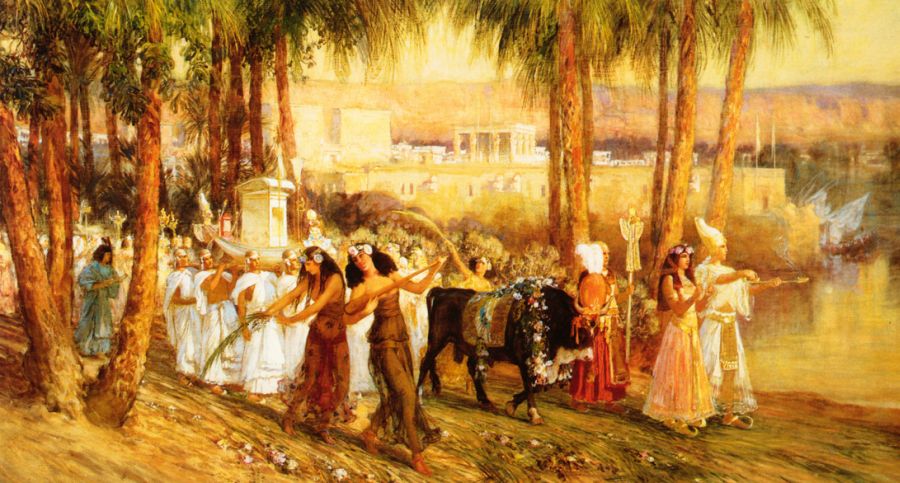
The nuptial celebrations of Nea-Isis
Isolated in Bactria, Cleopatra had sought allies amongst her Indo-Greek neighbours, so as to obtain some form of protection from impending aggression against her and her son. Having been annointed crown prince by the last universally recognised and accepted Suren (the Parthian "Field Marshal", who ranked just below the King who he crowned), Alexander Helios was a prime target for any of the contenders attempting to take the Parthian throne. He had fled Hyrcania in the wake of Artabanus' feud with Phraates, seeking refuge with his mother in her mountain kingdom, where they anxiously awaited the almost certain agression from whomever emerged as victor in the Parthian succession dispute. It was now clear Phraates had no chance of victory, and the demise of Cleopatra, her son and her small domain in the highlands would naturally follow shortly.
Though the minor surviving Indo-Greek princes were loathe to take up arms against the Parthians of their own accord, they were friendly to Cleopatra's cause. They indicated to her the prince and chieftain Sapadbizes, leader of his own band of warriors. Though involved in a war of his own, Sapadbizes answered her call and promptly showed up with his army at Bactria, taking both the kingdom and Cleopatra's hand in marriage in exchange for his aid and protection.

Phraates' men fight to protect Ectabana
The Jewish duo Asinai and Anilai had considered declaring for Phraates, but held off; for now Darius and his ally Artabanus had the upper hand. They knew that, ultimately, he desired the return of his only son and heir, who they had in their power; they had treated the boy well, and could hope for at least some clemency should they come to be in Darius' hands. They also held a considerable swathe of land, from Assyria to Elam, which Darius desired and which they could deliver into his hands immediately, if they so wished, or rather, if his terms were acceptable.
Phraates' dire situation was alleviated by the arrival on the scene of Vipsanian, who had no wish to see a resurgent Media conquer the Parthian Empire, unite it with Media Antropatene and possibly even Sophene (the recently enlarged kingdom of Lesser Armenia held by Darius' father, the Roman client Artavasdes). Vipsanian began his campaign by splitting his force in two; the greater portion marched east, under his command, into Antropatene, whilst the smaller headed for Edessa; having subjugated the respective domains the two forces were to rendezvous in Mesopotamia before marching against the Parthians. Edessa willingly submitted to the Romans upon their arrival; Antropatene however proved a greater task. It was from Antropatene that Vipsanian clinched the deal that sealed his plans for the East. He offered his aid to Artabanus for the latter's bid for the Parthian throne, so long as Artabanus deserted his ally Darius. Instead of sharing the Parthian Empire with Darius, Artabanus would keep the entirety of his conquests, whilst Vipsanian intended to add Osrhoene, Adiabene, Armenia and Antropatene to Rome's eastern holdings - securing complete control of Armenia and expanding Roman rule towards the Tigris.
Artabanus dithered for a month; his opinion was only swayed definitively in Rome's direction by a sudden reverse in events as Phraates scored his first major victory, pushing back Darius' forces. If Phraates managed to turn the tide, he would have need of a stronger ally than Darius; if he was to establish himself as King of Kings, a foreign ally without pretensions on internal Parthian matters made for a better deal than a neighbouring ally with blatant aspirations towards the Parthian throne. His betrayal was soon made known to Darius, who was forced to turn back from Media to protect his rear from Roman aggression.

The nuptial celebrations of Nea-Isis
Isolated in Bactria, Cleopatra had sought allies amongst her Indo-Greek neighbours, so as to obtain some form of protection from impending aggression against her and her son. Having been annointed crown prince by the last universally recognised and accepted Suren (the Parthian "Field Marshal", who ranked just below the King who he crowned), Alexander Helios was a prime target for any of the contenders attempting to take the Parthian throne. He had fled Hyrcania in the wake of Artabanus' feud with Phraates, seeking refuge with his mother in her mountain kingdom, where they anxiously awaited the almost certain agression from whomever emerged as victor in the Parthian succession dispute. It was now clear Phraates had no chance of victory, and the demise of Cleopatra, her son and her small domain in the highlands would naturally follow shortly.
Though the minor surviving Indo-Greek princes were loathe to take up arms against the Parthians of their own accord, they were friendly to Cleopatra's cause. They indicated to her the prince and chieftain Sapadbizes, leader of his own band of warriors. Though involved in a war of his own, Sapadbizes answered her call and promptly showed up with his army at Bactria, taking both the kingdom and Cleopatra's hand in marriage in exchange for his aid and protection.
Last edited:
Awesome!
This timeline has completely captured my attention! More please! Subscribed!
Hero of Canton
This timeline has completely captured my attention! More please! Subscribed!
Hero of Canton
Last edited:
Updates.....just amazing!
Thanks man
These updates are awesome! I especially love how often you udpate them.
Thanks - slightly ironic I've taken so long since then to update
This timeline has completely captured my attention! More please! Subscribed!
Hero of Canton
Thanks Hero! I get a bit discouraged when there's not many replies, since I always end up spending hours researching each single post, and then it seems like no one's reading.
Anything you guys would like to suggest or see happen to Cleopatra?
Well I don't normally care for classical timelines (mainly because my understanding of the period is quite limited) I just binged through this entire thread. Can't wait for the next update!
Fantastic TL. I just discovered it today. Great attention to detail, especially in the East. Its really too bad that there is such a paucity of sources about the Greco-Bactrian Kingdom, otherwise we might more TL's like yours here paying more than passing attention to it.
The whole incest angle is rather was rather unexpected, I had no idea it was considered anything less than abominable outside of Egypt, even in the Near East.
This Third Triumvirate seems to be working out far better for the Republic than might have been expected. As long as one individual cannot consolidate power, the Senate will maintain at least some power. Though Ceasarion hanging around in Rome does not bode well for the continued role of the Senate.
The whole incest angle is rather was rather unexpected, I had no idea it was considered anything less than abominable outside of Egypt, even in the Near East.
This Third Triumvirate seems to be working out far better for the Republic than might have been expected. As long as one individual cannot consolidate power, the Senate will maintain at least some power. Though Ceasarion hanging around in Rome does not bode well for the continued role of the Senate.
Fantastic TL. I just discovered it today. Great attention to detail, especially in the East. Its really too bad that there is such a paucity of sources about the Greco-Bactrian Kingdom, otherwise we might more TL's like yours here paying more than passing attention to it.
The whole incest angle is rather was rather unexpected, I had no idea it was considered anything less than abominable outside of Egypt, even in the Near East.
This Third Triumvirate seems to be working out far better for the Republic than might have been expected. As long as one individual cannot consolidate power, the Senate will maintain at least some power. Though Ceasarion hanging around in Rome does not bode well for the continued role of the Senate.
I find the Greco-Bactrians incredibly interesting and am glad to be able to include them in my TL. Together with the other Greek communities throughout the East they will provide an important power base for Alexander Helios. In many ways Alexander Helios' kingdom will be more Greco-Bactrian than anything else, with Indo-Greek especially apparent in the state faith - a nifty Ptolemaic reinvention of Greco-Buddhism
Incest also occurred among the Seleucids, who intermarried with the Ptolemies, and the Parthian royals, who intermarried with the Seleucids. The Kings of Nabataea (in Arabia) and Adiabene (in Assyria) also married sister-wives, although we don't know how often. From Herod The Great onwards the Herodians generally married within the family, either nieces or cousins, in contravention of Jewish law; I imagine if it wasn't for the restrictions of Judaism they'd have gone all out (Herod's mother was a Nabatean princess so the concept wouldn't have been at all foreign to him). With Cleopatra and other Ptolemy scions surviving, and her two sons playing pivotal roles in the formative years of two Empires, the practice continues on for a while longer. Indeed, it will become an institutionalized part of monarchy and state religion in the East. Although Cleopatra's children are vigorous and healthy, being the children of unrelated males, once they and their descendants get inbreeding (remember also Caesar and Mark Anthony were cousins) things will get ugly - decreased fertility, inbreeding depression, mental and physical maladies Habsburg style.
It's crazy how their conviction in their own divinity was so absurdly strong that it basically over-rode the most basic human instincts. I was reading the other day about the effects of incest among the Ptolemies, and how brutal they were with each other - basically, having sexual intimacy with close relatives goes against our natural instincts, with the end result that other natural instincts (the normal love bond you'd feel for your parents and siblings) also get done away with/perverted. Interestingly the Seleucids and Parthians also had their fair share of civil war, so this could well be why. Naturally this will also be reflected in the TL
As for the Third Triumvirate, whilst it's certainly beneficial to the Republic (as an institution), it's not all that good for the Empire. The division of East-West is becoming enshrined far earlier than before, with what consequences I know not
Last edited:
Hmm, with a state in Persia with a religion that they might want to evangelize means we likely won't see OTL's resurrection of Zoroastrianism? (Getting way ahead of the TL I know, but the Sassanids is where my knowledge of history picks up again after the Punic Wars)
Hmm, with a state in Persia with a religion that they might want to evangelize means we likely won't see OTL's resurrection of Zoroastrianism? (Getting way ahead of the TL I know, but the Sassanids is where my knowledge of history picks up again after the Punic Wars)
The state religion I have in mind is an adapted form of Greco-Buddhism, with aspects of Ptolemaic and very light Zoroastrian aspects. Similar in a way to Elizabeth Tudor's "middle way", hopefully being a flexible compromise that doesn't really offend the uneducated populace of the vast eastern territories.
The state religion I have in mind is an adapted form of Greco-Buddhism, with aspects of Ptolemaic and very light Zoroastrian aspects. Similar in a way to Elizabeth Tudor's "middle way", hopefully being a flexible compromise that doesn't really offend the uneducated populace of the vast eastern territories.
So a religious civil war in a century or so then?
It will be interesting if a more Hellenic culture among the Persian elite begins to develop anyway/
Out of curiosity, is putting the years in BC a helpful convention for the reader, or is Christianity going to develop roughly as OTL?
So a religious civil war in a century or so then?
It will be interesting if a more Hellenic culture among the Persian elite begins to develop anyway/
Out of curiosity, is putting the years in BC a helpful convention for the reader, or is Christianity going to develop roughly as OTL?
Christianity is going to develop as OTL, although "Christ" and "Lucifer" will be Imperial titles so I'm retroactively giving some added background to their use in Christianity
As for religious civil war, we already have a minor one going on with Sapadbizes (devoted to Nanaya) civil war against his brother Pseigacharis (Buddhist). Further involvement in India and China will further spice things up in the East, but religion is primarily a tool of the monarchy to exalt and legitimise it's actions, so not sure how central a role it'll play in civil wars.
That said, the simultaneous growth of Christianity and Greco-Buddhist cult of Isis, plus Jewish monarchies in Judaea, Assyria and Babylonia will make for some interesting religious dynamics
Christianity is going to develop as OTL, although "Christ" and "Lucifer" will be Imperial titles so I'm retroactively giving some added background to their use in Christianity
As for religious civil war, we already have a minor one going on with Sapadbizes (devoted to Nanaya) civil war against his brother Pseigacharis (Buddhist). Further involvement in India and China will further spice things up in the East, but religion is primarily a tool of the monarchy to exalt and legitimise it's actions, so not sure how central a role it'll play in civil wars.
That said, the simultaneous growth of Christianity and Greco-Buddhist cult of Isis, plus Jewish monarchies in Judaea, Assyria and Babylonia will make for some interesting religious dynamics
Lucifer makes sense as title, considering how the timelines progressed so far, Christ I'm curious about.
So probably no Zurvanite Persia then? Shame, I always liked the Zoroastrians.
I'm also really curious how sustainable the Jewish monarchies in Assyria and Babylonia will be.
Share: